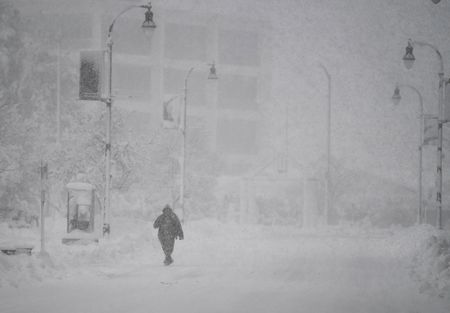By Scott DiSavino
(Reuters) -U.S. natural gas and power prices hit multi-year highs on Friday ahead of extreme cold that was expected to bring record gas demand while also cutting supplies by freezing wells.
Lower gas supplies at a period of surging demand could test power systems in hard-hit areas. Winter storms in 2021 and 2022 caused widespread damage and power outages in part because many power plants lacked sufficient fuel to operate.
U.S. gas output was on track to drop by 3.7 billion cubic feet per day (bcfd), or 3.4%, over the past five days to a preliminary 10-week low of 104.5 bcfd on Friday, according to financial firm LSEG. [NGA/]
That decline so far was small compared with gas supply losses of around 19.6 bcfd during a winter storm in December 2022, and 20.4 bcfd during another winter storm in February 2021, according to LSEG data.
Still, U.S. gas demand, including exports, was on track to reach 165.9 bcfd on Jan. 15, 174.3 bcfd on Jan. 16 and 172.9 bcfd on Jan. 17, according to LSEG.
Those daily demand forecasts would top the current all-time high of 162.5 bcfd set on Dec. 23, 2022, according to federal energy data from S&P Global Commodities Insights.
“TAKE EXTRA CARE”
The freeze is expected to move from the U.S. Pacific Northwest to the central and eastern parts of the country over the next few days. Power grid operators in its path have already told generator owner members to prepare their units to run before electric demand starts to increase.
In a sign of what may be coming, next-day power prices at the Mid Columbia hub in the Pacific Northwest soared to a record high of around $1,075 per megawatt hour, according to LSEG data going back to 2010. That compares with averages of $81 in 2023 and $52 from 2018 to 2022.
“Generator owners must take extra care to maintain equipment so that it doesn’t freeze in the cold … particularly as natural gas pipelines may become constrained as the cold spell progresses,” PJM Interconnection said in a release.
PJM is the nation’s largest grid operator covering parts of 13 states from Illinois to New Jersey.
Grid operator Southwest Power Pool (SPP) and the Electric Reliability Council of Texas (ERCOT) have also issued weather advisories.
Projected overnight temperatures in Midland, Texas, in the Permian shale, the nation’s biggest oil and second biggest gas producing basin, will drop below freezing every night from Jan. 13-16, falling to a low of 6 degrees Fahrenheit (minus 14 degrees Celsius) on Jan. 15, according to meteorologists at AccuWeather.
Freezing weather can lead to so-called freeze-offs, which can reduce oil and gas production.
GAS PRICES JUMP
Spot gas prices at the Eastern Gas South hub jumped from around $2.45 per million British thermal units (mmBtu) on Thursday to $10.40 on Friday, their highest since July 2008, according LSEG data.
That compares with averages of $1.68 per mmBtu in 2023 and $2.96 from 2018 to 2022.
Other next-day gas prices soared to their highest since the February freeze in 2021, including the U.S. Henry Hub benchmark in Louisiana at $13.20 per mmBtu, Waha in West Texas at $17.23 and Chicago at $23.35.
In Canada, meanwhile, next-day gas prices at the AECO hub in Alberta soared to around $9.71 per mmBtu, their highest since February 2014. The Alberta grid operator on Friday asked electricity users to conserve power, following record demand Thursday.
(Reporting by Scott DiSavinoEditing by Marguerita Choy and Chris Reese)










